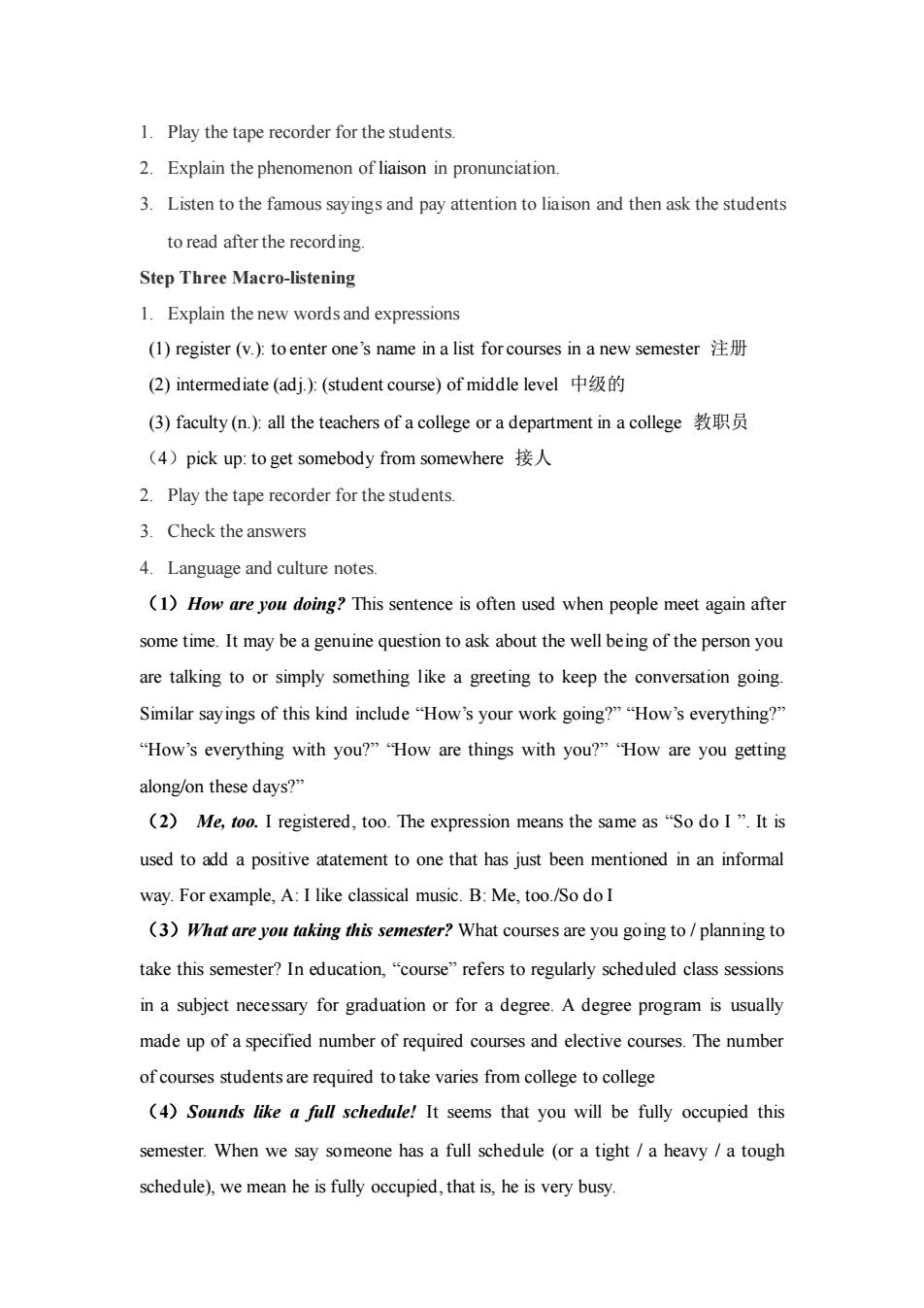正在加载图片...

1.Play the tape recorder for the students. 2.Explain the phenomenon of liaison in pronunciation. 3.Listen to the famous sayings and pay attention to liaison and then ask the students to read after the recording. Step Three Macro-listening 1.Explain the new wordsand expressions (1)register (v.):toenter one's name in a list forcourses in a new semester (2)intermediate(adj)((student course)of middle level中级的 (③)faculty(n.)all the teachers of a college or a department in a college教职员 (4)pick up::to get somebody from somewhere接人 2.Play the tape recorder for the students. 3.Check the answers 4.Language and culture notes. (1)How are you doing?This sentence is often used when people meet again after some time.It may be a genuine question to ask about the well being of the person you are talking to or simply something like a greeting to keep the conversation going. Similar sayings of this kind include"How's your work going?""How's everything?" "How's everything with you?""How are things with you?"How are you getting along/on these days? (2)Me,too.I registered,too.The expression means the same as"So doI".It is used to add a positive atatement to one that has just been mentioned in an informal way.For example,A:I like classical music.B:Me,too./So doI (3)What are you taking this semester?What courses are you going to/planning to take this semester?In education."course"refers to regularly scheduled class sessions in a subject necessary for graduation or for a degree.A degree program is usually made up of a specified number of required courses and elective courses.The number of courses students are required to take varies from college to college (4)Sounds like a full schedule!It seems that you will be fully occupied this semester.When we say someone has a full schedule(or a tight/a heavy /a tough schedule),we mean he is fully occupied,that is,he is very busy. 1. Play the tape recorder for the students. 2. Explain the phenomenon of liaison in pronunciation. 3. Listen to the famous sayings and pay attention to liaison and then ask the students to read after the recording. Step Three Macro-listening 1. Explain the new words and expressions (1) register (v.): to enter one’s name in a list for courses in a new semester 注册 (2) intermediate (adj.): (student course) of middle level 中级的 (3) faculty (n.): all the teachers of a college or a department in a college 教职员 (4)pick up: to get somebody from somewhere 接人 2. Play the tape recorder for the students. 3. Check the answers 4. Language and culture notes. (1)How are you doing? This sentence is often used when people meet again after some time. It may be a genuine question to ask about the well being of the person you are talking to or simply something like a greeting to keep the conversation going. Similar sayings of this kind include “How’s your work going?” “How’s everything?” “How’s everything with you?” “How are things with you?” “How are you getting along/on these days?” (2) Me, too. I registered, too. The expression means the same as “So do I ”. It is used to add a positive atatement to one that has just been mentioned in an informal way. For example, A: I like classical music. B: Me, too./So do I (3)What are you taking this semester? What courses are you going to / planning to take this semester? In education, “course” refers to regularly scheduled class sessions in a subject necessary for graduation or for a degree. A degree program is usually made up of a specified number of required courses and elective courses. The number of courses students are required to take varies from college to college (4)Sounds like a full schedule! It seems that you will be fully occupied this semester. When we say someone has a full schedule (or a tight / a heavy / a tough schedule), we mean he is fully occupied, that is, he is very busy